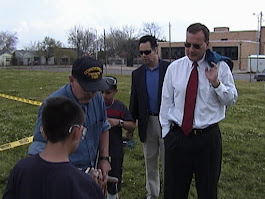Motivational Moments
Overcome language and low income stigmas
that label many non-English speaking students
by focusing on dreams instead of limits
that label many non-English speaking students
by focusing on dreams instead of limits
Teaching English-language-challenged students has its rewards. It can also be a source of utter frustration when a teacher experiences unexpected and uncontrolled outcomes. Unfortunately, I know too many teachers that struggle with them. I am not always successful in making rewards more likely. But, I have more successes I can talk about than I have negative outcomes.
I harbor a belief that there is an incredible intellect with an insatiable desire to learn something new within every student. They do not have to match Albert Einstein's brilliance at theory and so on. But, it's there for the teacher to pull out to help them use it. I was an English challenged student myself when I was their age, and so was my sister and my brother. I can tell you that unequivocally students are sponges for anything and everything when they are growing up.
I took very seriously my responsibility to add incite with insight to create lifelong learners with a passion for imagining the possible. Motivate them and help them build a good mathematics foundation when they're in middle school and early high school and you can light up their minds with a learning light that will shine for the rest of their lives. The research tells us, however, that after a certain age, much of their character, learning style and wherewithal to achieve is outlined even though it may not be set in stone.
What makes teaching so difficult is the "square" and the "round" dilemma. The "square" is the curriculum, the "round" is the collective class brain. Things start going wrong the minute a teacher tries to fit a square curriculum into students' round brains. Instinctively, teachers use strategies that water down, or dummy down, the curriculum. All they succeed in doing is making students feel as dumb as the teacher thinks they are. They are not dumb. There is simply nothing the teacher has presented them that they feel is worth their attending to the teacher's schtick.
There are many, many things teachers have to do to make progress, no one thing will do it, and it is by no means easy because the progress that is made is different for every student. It is also a value judgment as to whether that progress is enough or not. Yes, I am one of those teachers who believes, as I always believed as a student, that I have learned more by my education than any high stakes test was ever able to measure.
One of the things my students seemed to relish included stories within which it was possible for them to place themselves. Stories I would use were not of train wrecks or hyperbole. Stories that seemed to hold my students attention better and longer were those that they could identify with what was going on in the story. So much so that they could imagine what they would be doing in the same situation that was being described. They did not need to be defensive or impulsive about their feelings. They would just think, "Hey, that could be me..."
There is a slew of research papers one can review to get a sense of likely resultant behavior that can be predicted from given stimuli and situation, why that behavior was manifested, and how long that behavior will last. But, I am not and do not want to be a psychologist; I do not want to be a physiologist; I do want to be a pure researcher. I do not need to be that accurate. All I need to know is that what I do will be at least 80% likely to generate a positive outcome in my students' collective brains and it will set them up to be successful.
For the similar reasons that personal computing soared exponentially by not requiring ordinary people to be programmers, I don't want or need to spend a huge amount of time to be more correct on the subject of psychological behavior. I just want to be 80% correct, because nobody can ever come to a 100% certainty. None of the research papers, that's right, none, are 100% certain about their conclusions. It would take me the rest of three lifetimes to improve on that last 20% towards absolute certainty. In other words, learners will spend 20% of the time needed to evaluate 80% of the information on any given subject. They will spend 80% of their overall research time trying to evaluate the last 20%.
A business colleague introduced me to that 80:20 rule, and as a result, the enormous volume of information that is available on any given subject does not overwhelm my ability to make a decision when one has to be made. I would consider my life worthwhile on this earth if any of my students could do the same thing when they had to.
I do try to back up strategies and methods that I use with what research has found out about what I am doing. No, their research situations are not always the same as my situation. They do not have to be for me to be 80% sure that what I am doing is relevant and purposefully good. Research papers I look for are those I can understand and that enable me to generalize without being a PhD. I look for research papers that review research that tests or attempts to prove theories. They summarize the conclusions many other researchers have come to, and thereby save me a great deal of time.
For teaching purposes, knowing and understanding how video games impact learning comes closest to what I need to know. So, it synthesizes the body of knowledge for my particular purposes on the subject of video games effects. Too many teachers have been suckered into believing that teaching is like playing a video game. They have adapted their teaching style to be more similar to gaming. What they have largely ignored is how to adapt to the unknown. I would highly recommend the research link above over any one single research paper to get closer to being 80% correct in what I am doing in the classroom.
What I have concluded and proven to myself, I have applied in my classroom:
- Attention will be longer and memories will be more memorable with affective motivation that edifies not deifies students to action-hero status;
- Stories do not need to shock the daylights out of students, hormones stirred up will fade relatively soon;
- Affective stories generate empathy and illustrate how to deal with variables;
- There's no need to hypnotize, mesmerize, or stigmatize students.
That it recounts a true event, makes it easier to tell and dramatize for maximum affect.
And it plants seeds of hope for their educational purpose.
Thank You!
(Creative Commons License, see terms at end of posting)
The crowd of wild-eyed, mesmerized little boys chanted in unison, "Six! Five! Four!" He felt his heart pounding as though it would leap from his chest. "Three! Two! One! Ignition!" His finger pressed the button, and an electrical current traveled through two small wires. "Liftoff!" Swish! The slender tube streaked skyward with a cloud of smoke.
He remembered his brother, who had introduced him to these flying marvels that had held his interest for over 45 years. He said a silent prayer.
Forty-five years ago, had it been that long? It seemed only yesterday that he dove into the intricacies of designing, building and flying rockets. He even tracked them and used his newly learned trigonometry to determine how high they went. His high school physics teacher talked him into entering the district's first-ever interscholastic rocketry meet his senior year. He entered five events, four for which he was to receive first-place ribbons: spot landing, egg loft, high altitude, and glider. He had a lot of memories in those rockets when He went off to college.
He wanted to be an astronaut. Living close to the nation’s NASA Manned Space Center will do that to you. Bitten by the bug to see the earth from space and to float weightless in the black vacuum he had only read about, he dreamed he could feel himself pressed back in the capsule seat as he swished off into imaginary orbit with every flight. What a rush!
Once he had moved out of the house and into the dormitory at college, his mother boxed up and stored his rockets in the garage. One weekend visit home, his mother roused him from his near vegetative state in front of the television.
"George, George, George!" she exclaimed.
"What!" he answered back.
She pointed to the yard and continued to exclaim, "Your, your, rockets! The, the, the boys!"
He caught a glimpse of her concern, as he followed her finger out the window. He saw little balsa wood fins popping off the rockets which two little boys twirled. A little boy he didn't recognize had joined the eight-year-old neighbor boy, Jason, in a jig of destruction. He felt this overwhelming sense of indignation swell up inside of him as he saw the empty storage box lying nearby.
George darted outside not really mad, just kind of mindless. The little neighbor boy, Jason, bolted away like a scared rabbit as he saw him approach. But, the other little boy just continued twirling Big Bertha, a rocket George had so painstakingly birthed and proudly flew. (Several years before Big Bertha, a multi-blue-ribbon-winner by the way, carried an egg aloft and brought it safely back for one blue ribbon and it also succeeded in landing within six feet of a flag posted some 300 feet downrange to win another blue ribbon.)
He could hardly contain himself. He sprinted through the den, out the door, and over the patio fence, like an untamed stallion, racing toward this little boy. All the while he could hear his mother in the background saying, "Don't hurt them, George, please, don't hurt them!"
Another fin popped off as he arrived out of breath. Then, George stopped abruptly, bridled short as a master bridles his horse. Suddenly and unexplainably, he saw himself as that little boy. Three feet from him George dropped to one knee, and with a shaky voice, he asked, "Hey, buddy, what're you doing?"
The wild-eyed, smiling face of a mesmerized little boy looked at him. Still spinning his prized Bertha rocket at speeds that would destroy even the space shuttle, he said, "I'm, I'm flyyyinggg!"
George mustered up control from somewhere, slowed the little boy down to warp speed, gently took the rocket from his careless fingers, and asked him, "Don't you know that this thing can really fly?"
He didn't think eyes could get any wider than when he asked if the little boy wanted to fly it with him.
"OH, WOW!" he exclaimed, "SURE!"
Off they went to fly the rocket.
About ten years passed. George’s dream of becoming an astronaut faded away when a naval flight surgeon discovered a heart murmur fluttering in his chest. The last step prior to enlisting in the Navy's Aviation Reserve Officer Candidate program, the flight surgeon pulled down his stethoscope and said, "The Navy won't take you. You might as well just accept that and move on." So, instead, George completed college and entered the ranks of oil tycoons.
Living a thousand miles away in Florida then, George once again came home to visit the folks. He went outside. As he stood by the side of the house, a young man obviously of high school age, but nobody he recognized, walked up to him.
Tentatively, he said, "Hi. I don't know if you remember me or not. But, when I was eight years old, I was in your yard playing with rockets. You took me to fly one of them." George had only a vague recollection of the incident. "Anyway," the little boy said, "I have been interested in rockets ever since. In fact, I studied everything I could learn about them. I'm about to graduate from high school, and, making pretty good grades, I got an appointment to Annapolis. You see, I am going to be an astronaut. Well, I just wanted to come by to thank you for getting me started."
The young man turned and walked away, never having told George his name. But, that didn't seem to matter to him. He realized that he had just received a blessing he would remember for the rest of his life, a firsthand confirmation of the influence he had on a person. George just walked away in a daze whispering a thank-you prayer that he hadn't backhanded the little kid for destroying his rockets.
Today, as he thinks back and re-tells this story to students he teaches, he adds to it the knowledge that he would not have had the pleasure of this experience if his own brother had not introduced him to rockets. George’s dream of flying into space lives on in this young man.
The little boys scampered, almost uncontrollably; chasing after the rocket that had just streaked into the sky. "I see it," one said. "I'm going to try to catch it," said another.
George looked heavenward. Tears streaked his cheek as he said a silent prayer, "Louis, I love you and miss you and I know you're on your knee before Jesus' cross. Thank you for sharing your rockets with me. I have always been interested in them since then. I thought you might like to keep your eye out for an astronaut circling the Earth now and then, and ask the Lord to watch over him. He enjoyed the rockets you showed me so much that he decided to ride one personally."
"Three! Two! One! Ignition! Liftoff!" Swish! "I see it; I'm going to try to catch it!"
Sixth Grade Rocket Club Students Logging Field Flight Journals
Students Logging Flight Field Journals Ex-Astronaut Rick Hieb STS-39, 49, 65 (in tie)
Send your comments to: aulygeo@gmail.com













Comments
Post a Comment